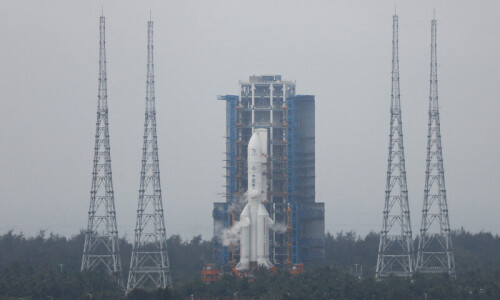ISLAMABAD: A government ally stirred a controversy over what self-determination should mean for Kashmiris as the National Assembly passed a resolution on Tuesday demanding their association in the future dialogue between Pakistan and India to settle the longstanding dispute.
The house unanimously passed a comprehensive resolution moved by the chairman of its special committee on Kashmir, Maulana Fazlur Rehman, reiterating Pakistan’s traditional stand for a solution of the Kashmir dispute through a UN-mandated plebiscite, ahead of a day of solidarity with the Kashmiri people’s struggle to be marked in Pakistan and Azad Kashmir on Wednesday as a national holiday.
But Mahmood Khan Achakzai, leader of the government-allied Pakhtunkhwa Milli Awami Party, caused some apparent unease on the treasury benches by sounding a discordant note, saying the internationally recognised right to self-determination should not mean only a choice between India and Pakistan but also a third course like an independent Kashmir.
He said neither those describing Kashmir as the “jugular vein” of Pakistan – a statement attributed to Pakistan’s founder Quaid-i-Azam Mohammad Ali Jinnah -- nor those calling the state an ‘atoot ang’, or integral part, of India were Kashmiris, and pleaded that “ask their ‘rooh’ (soul)” whether they wanted to join Pakistan or India or have an independent state of their own.
But Maulana Fazlur Rehman, speaking after the resolution was passed, insisted that the plan for the partition of then British-ruled subcontinent at independence in 1947 and resolutions passed later by the UN Security Council following the first of the two India-Pakistan wars over Kashmir gave the people of the Himalayan state the only option of choosing to accede to either of the two countries.
The resolution, passed after only some subdued criticism of India, said the house “impresses upon India that since Kashmiris are the original and real party to the Jammu and Kashmir dispute, they should, therefore, be associated in the dialogue process”.
It reiterated Pakistan’s “full political, moral and diplomatic support to the Kashmiri people’s just stand” and condemned what it called “large-scale violations of human rights” in India-held Kashmir.
It demanded that the Indian government withdraw its military forces from cities in the territory, allow a neutral inquiry into unmarked graves found in the area, release all political prisoners, repeal all the laws giving special powers to armed forces stationed there and hold “meaningful, result-oriented and time-bound” talks with Pakistan.
INDIAN DAMS: On what was a private members’ day, the house earlier heard some more speeches criticising India for its perceived plans to deny Pakistan of its full share of rivers flowing from Kashmir before passing a private resolution, pending since Dec 17 after being moved by a member of the opposition Pakistan Peoples Party (PPP), Ms Belum Hasnain, urging the government to “take immediate steps to resolve the issue of construction of dams by India on the waters of Pakistan”.
A PPP member from Sindh province, Ms Nafisa Shah, demanded the formation of a parliamentary or other commission to re-examine the 1960 Indus Waters Treaty between India and Pakistan, its violations, and “how we move forward”.
Minister for States and Frontier Regions Abdul Qadir Baloch dismissed oft-repeated fears that the present or planned dams in India-held Kashmir over rivers coming to Pakistan’s share under the 1960 treaty would turn Pakistani irrigated lands barren, but he assured the house that the government would not “sleep over” what he called a matter of serious concern.
Responding to a call-attention notice from five members of the Muttahida Qaumi Movement, the minister for Kashmir Affairs and Gilgit-Baltistan, Mohammad Birjees Tahir, informed the house that inquiries conducted by the National Accountability Bureau had revealed an alleged misappropriation of Rs31 billion by 17 companies who fraudulently collected the money from people promising them more lucrative interest-free profit than given by banks.
The minister said some of the owners or other functionaries of these companies, posing as ‘tablighi’, or preaching, missionaries, used mosques to announce on loudspeakers that it was for the “glory of Islam” that they wanted to rid the country of what they called an un-Islamic practice of receiving or giving interest through their interest-free Islamic modaraba instruments.











































